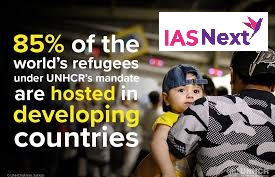CURRENT AFFAIRS
Get the most updated and recent current affair content on Padhaikaro.com
Draft law on refugee rights
- IAS NEXT, Lucknow
- 19, Feb 2022

Reference News
The NHRC recently held a discussion on “protection of the basic human rights of refugees and asylum seekers in India”.
- During the meet, the participants expressed concern over the issue of India not having a specific law for refugees and asylum-seekers.
- It was also suggested that model laws on asylum and refugees that were drafted by the National Human Rights Commission (NHRC) decades ago but not implemented by the government could be revised by an expert committee.
Need for a law in this regard:
The refugees and asylum seekers were entitled to the rights in Articles 14, 20 and 21 of the Constitution. Therefore, it becomes the responsibility of the state to protect these rights.
- There was a lack of clarity for law enforcement agencies as well.
- If such laws were enacted, it would give legal sanctity and uniformity, ensuring the protection of human rights.
Key suggestions made:
- Update the two old NHRC documents regarding the domestic asylum laws and model law for refugees.
- Constitute a panel/committee of scholars and domain experts to update these draft laws.
About the Refugee Convention 1951:
- It is a United Nations multilateral treaty that defines who is a refugee, and sets out the rights of individuals who are granted asylum and the responsibilities of nations that grant asylum.
- The Convention grants certain rights to people fleeing persecution because of race, religion, nationality, affiliation to a particular social group, or political opinion.
- The Convention also sets out which people do not qualify as refugees, such as war criminals. The Convention also provides for some visa-free travel for holders of travel documents issued under the convention.
- The Convention builds on Article 14 of the 1948 Universal Declaration of Human Rights, which recognizes the right of persons to seek asylum from persecution in other countries. A refugee may enjoy rights and benefits in a state in addition to those provided for in the Convention
- The 1967 Protocol included refugees from all countries as opposed to the 1951 Convention that only included refugees from Europe.